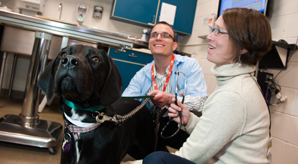

Imagine how your teeth would look and feel if you didn’t brush them for years – or even for just a couple of weeks. Your pet’s teeth are no different. Unless you regularly provide some form of dental care, you are ignoring an important part of your pet’s overall health and wellness.
Ever since cats and dogs became domesticated, their natural source of “dental floss” and teeth cleaning – their prey – has been in large part removed from their diet. Canned and dried foods, the nutritional replacement for your pet’s traditional diet, simply cannot provide the same level of oral hygiene and most pets suffer the consequences.
Dental disease is an infection of the teeth, gums, and surrounding structures and is by far the most common major health problem of cats and dogs. According to the American Veterinary Dental Society, more than 80 percent of dogs and 70 percent of cats show signs of oral disease by the time they are 3 years old.
It starts with a build-up of plaque. Plaque eventually turns to tarter and quickly forms small pockets where an animal’s gums meet its teeth. The gums can separate from the tooth and this allows more bacteria and food to accumulate. This build-up leads to periodontal disease, which can allow bacteria to now enter the bloodstream leading to more serious health problems including heart, lung, and kidney disease if left untreated.
Symptoms of dental disease may include:
The key to managing dental disease is prevention. The American Animal Hospital Association Dental Care Guidelines recommends regular oral examinations and dental cleanings, under general anesthesia, for all adult dogs and cats. AAHA recommends these procedures at least annually starting at one year of age for cats and small-breed dogs, and at two years of age for large-breed dogs.
Daily tooth brushing is the best way to slow (and possibly prevent) the recurrence of dental problems. Feeding dry dental diets or dental chews may slow, but not prevent, the development of recurrent periodontal disease. Daily use of products that have been awarded the Veterinary Oral Health Council seal of product approval may help you use the most effective products to keep your pet’s teeth clean and the gum tissues and bone around the roots healthy.
For more information on brushing your pet’s teeth, visit the Colorado State University Veterinary Teaching Hospital’s Dentistry and Oral Surgery Service, and talk with your veterinarian about developing a dental care plan for your furry friend.
The CSU Veterinary Teaching Hospital provides comprehensive veterinary care. To make an appointment, call 970-297-500 or visit csuvets.colostate.edu